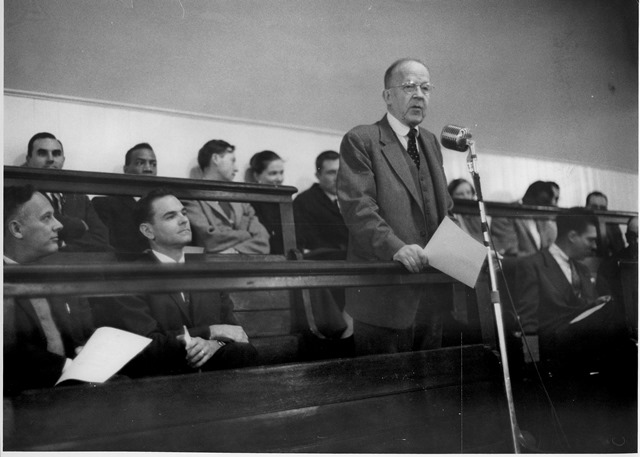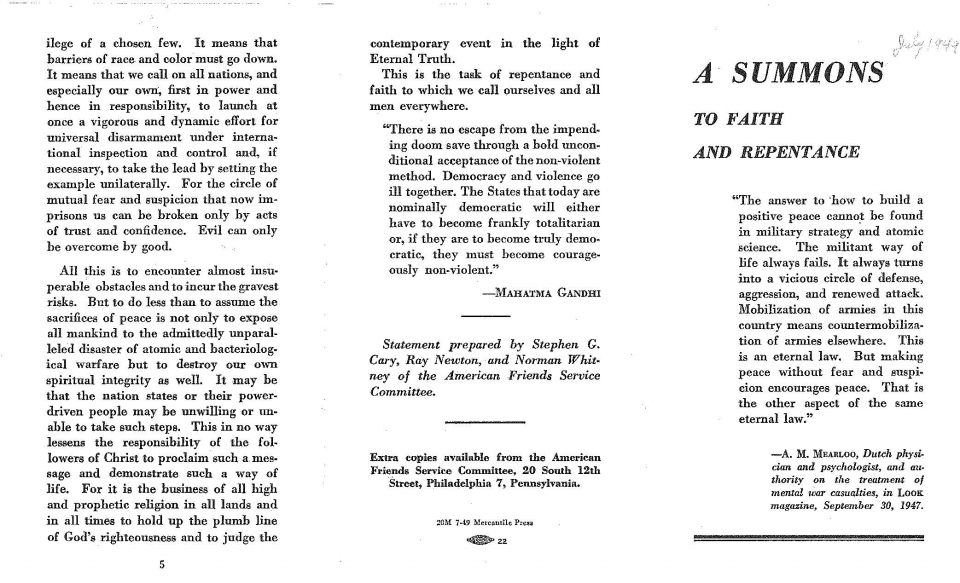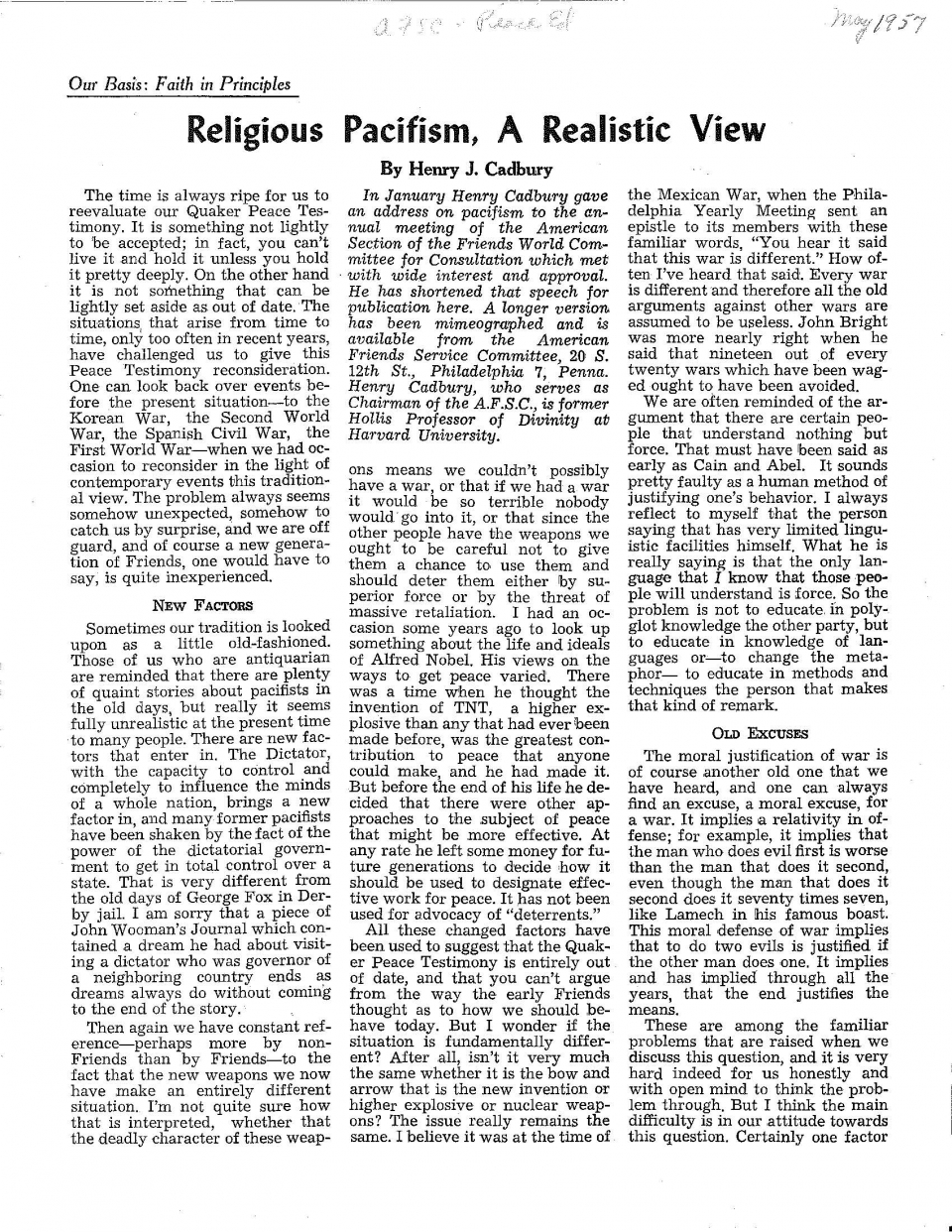
Henry Cadbury, co-founder of AFSC and author of "Religious pacifism: A realistic view," published in 1957. AFSC
Studying English in college, one of the things I loved most about literature of all kinds was how it connected me so deeply to the humanity of people living in other centuries and other countries. Now I love reading old publications down in the American Friends Service Committee's (AFSC) archives for the same reasons—to marvel at how language has changed while our core beliefs have remained the same.
In December 1967, AFSC placed an advertisement in The New York Times with the headline, “What days are holy?” It read, “At this time of the holy days of four world faiths—Christianity, Judaism, Buddhism and Islam—when men’s thoughts turn to peace, the American Friends Service Committee calls once again for the United States to take the lead in ending the war in Vietnam.”
AFSC has been in the business of advertising peace for almost 100 years now, and has been doggedly committed to using nonviolence and grassroots organizing as viable and achievable means of creating a more peaceful world. As the U.S. has sustained almost constant war during the 20th and now 21st century, the message has been the same—militarism is no way to ensure more security or more freedom.
This vision is grounded in religious convictions, though the religious foundation was sometimes more clearly articulated during AFSC’s earliest days, particularly in the publications I find in the archives. Throughout each one, it is clear that AFSC is based profoundly on a deep faith, unshaken by the actions of the American empire.
Wouldn’t it be easier if AFSC just let go of this whole “faith” concept altogether? It is a concept most easily dismissed or ignored, and makes many people these days, myself included, very uncomfortable. So often it is used as an excuse for inaction in the face of injustice, or, worse, an excuse for outright oppression.

What this faith perspective lends, I learned when reading this article, is a larger commitment to live into our ideals. “America must turn about,” the advertisement goes on to say. “Whatever others do, our country must stop hating and killing. … It does no good for America to profess faith in moral conduct unless American policy exhibits it.”
In this context, I read that faith means taking actions based on a deep belief in the potential for humans to do good, and is only valid if that belief is followed through fully and authentically. Faith seems to imply consistency in actions that are sustained through a deep trust of the righteousness of humanity. To live without faith is to live in fear—and to live in fear is to ensure annihilation.
During the Cold War, when annihilation seemed right on the horizon, AFSC became actively involved in the movement for nuclear disarmament. In the age of a threatened nuclear holocaust, faith must have seemed a fragile instrument for ensuring security. Sometimes, all we can do is trust and be humble.
Looking back to 1947, when AFSC published what might be called a religious “tract,” I found language about faith that I was, honestly, surprised to discover. In a pamphlet called “A Summons to Faith and Repentance,” AFSC calls for an American “turn about,” as phrased in that later article in The New York Times. The only way to avoid further war and catastrophe, it said, “requires of us that we individually and as a nation repent, that we literally turn about… not only from our use of mass violence but from what is worse—our readiness to use this violence whenever it suits our purpose, regardless of its cost to others.” To “turn about” requires faith, a deep faith in the ability of humans to trust one another and live in harmony together.
In my lifetime it seems as though faith has gotten a bad rap, and is often understood as the blind acceptance of an abstract “good” that cannot be proven. Henry J. Cadbury, one of the founders of AFSC, responds to this criticism in his 1957 article “Religious Pacifism, A Realistic View,” by asserting that faith is in fact an action, a “decision to practice and exemplify the good instead of the evil.”
 Perhaps the only real difference, then, between a religious approach to peace and a nonreligious one is a willingness to admit that we can only “prove” so much; the rest—the world we seek—must be built upon faith that it is possible, that it is good, and with the knowledge that we must work for it however we can.
Perhaps the only real difference, then, between a religious approach to peace and a nonreligious one is a willingness to admit that we can only “prove” so much; the rest—the world we seek—must be built upon faith that it is possible, that it is good, and with the knowledge that we must work for it however we can.
Faith is essentially human. For we are all acting on faith, every day—faith that our decisions will be the right ones; faith that we will be loved, cared for; faith that when we express ourselves honestly, we will have positive responses in return.
According to Cadbury, faith is “obedience to what seems to us a categorical demand, and it is by faith and faith alone that in the storms and stresses, in the arguments and debates, we can be expected as individuals and to any degree as a Society of Friends to maintain this testimony—not blindly, not untested, not against evidence, but by faith in its validity on moral grounds.”
During our time, like any other, remaining faithful to peace is a willingness to honestly engage with the world. It is a willingness to find meaning through our inherent desire to live and live well. To be faithful is to claim the connection that tugs at our souls, generation after generation.